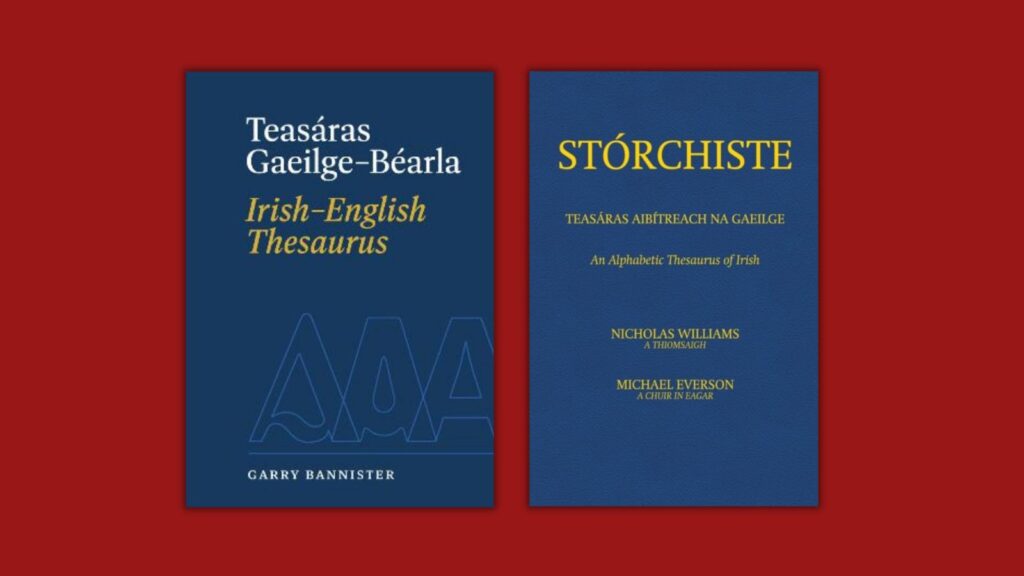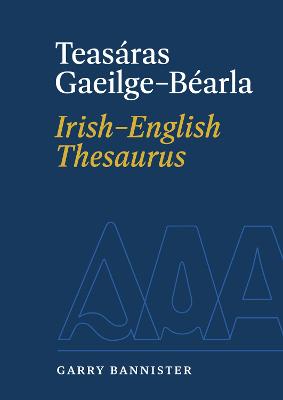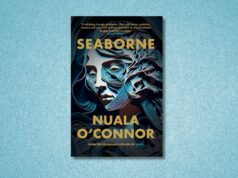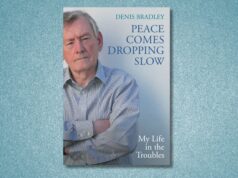
Teasáras Gaeilge-Béarla Irish-English Thesaurus|Garry Bannister|New Island Books|€54.95|Stórchiste Teasaras Aibítreach na Gaeilge An alphabetic Thesaurus of Irish|compiled by Nicholas Williams, ed Michael Everson|Evertype|€49.95
Lexicographical delight—two Irish language thesauri rich in detail
by Cathal Póirtéir
The time-worn cliché has it that you wait for ages for the 46A bus and then two or three arrive together. The same might apply to a thesaurus in Irish.
I was aware of Gaoth an Fhocail (Coiscéim), produced several years ago by the indefatigable scholar Breandán Ó Doibhlin, but apparently there have been others that I have not come across. While I found Gaoth an Fhocail useful it was a relatively modestly sized paperback and in no way comparable with the heftier Peter Mark Roget‘s Thesaurus of the English Language that sits on many of our bookshelves.
Now however, like the 46A, along come two new weighty hardback volumes: Teasáras Gaeilge – Béarla Irish English Thesaurus by Garry Bannister (New Island) and Stórchiste Teasaras Aibítreach na Gaeilge An Alphabetic Thesaurus of Irish, compiled by Nicholas Williams and edited by Michael Everson (Evertype).
No longer a uniquely English language tradition
The Bannister book comes in at slightly over 1,000 pages and the Williams at just over 600 pages. I presume no one but the editors or the proof readers will ever read from cover to cover of either tome but many of us will search and browse in both to our heart’s content for many years to come.
One of the first things I learned from Garry Banister’s introduction was that the thesaurus as a tool for writers is an English language project not repeated in other European languages. I must admit that I was very surprised; I had presumed that most major languages would have a thesaurus—but apparently that is not the case. But now it is no longer a uniquely English lexicographical tradition, as evidenced by the two volumes being looked at here.
many of us will search and browse in both to our heart’s content for many years to come
In both volumes the compilers acknowledge their debts to previously published dictionaries, dialect studies, works of fiction, non-fiction, poetry, folklore and fieldwork. Bannister tells us that this edition is the fruit of forty years of work carried out during a lifetime of learning and teaching, including many years lecturing in Irish in Moscow University.
A note on the back of the Bannister thesaurus tells readers that it contains ‘700,000 words, Translations, synonyms, colloquialisms, useful expressions, thematic lists, proverbs, a new grammar guide and cultural/historical connotations’.
Nicholas Williams is a lifelong scholar of Celtic languages and taught for many years in UCD (where I had the pleasure of attending his lectures on the language rich seventeenth century burlesque story of Pairlement Chloinne Tomáis.).
In recent years he has published Irish translations of The Hobbit and Alice in Wonderland. His thesaurus has 12,000 entries and 44,000 distinct words or phrases, and the author notes that previous Stórchistí in Irish treated words thematically, rather than the more user-friendly alphabetical arrangement in his volume.
Neither of these writers will ever be stuck for a word and neither should anyone who consults them.
Lexicographers’ pleasures
It would be space consuming here to give any detailed description of the different methodologies in these two books—but they work largely like alphabetical dictionaries where you search for a word and, if it is there, you find not so much a definition but a list of similar words, related by meaning or subject matter.
Both volumes include information boxes under a number of headings, such as a list of Irish rivers, household cats, assorted snakes and popes and anti-popes—in Williams and in Bannister there are the most common tradespeople, common dog breeds, positive human traits, crustaceans and marine molluscs.
There are lots more of those but you can see that they are to some extent personal and idiosyncratic choices; I presume that must be one of the small pleasures that keep lexicographers toiling away alone for decades.
Rich detail
There is no room for me to regale you with all the wonderfully rich detail given in these books. However, if we take for example the word dall, most commonly meaning blind, in both Williams and Bannister we are offered dozens of adjectives and nouns of similar meaning, and examples of phrases where dall is a keyword.
We also find other alphabetically listed headwords that begin with dall, many of them closely related in meaning. That generalisation holds for most of the entries.
The joy and danger of either of these works is that you will open it to do a quick search for options on one word but spend much longer than you intended, as your eye leads you through definitions, translations and related words and phrases. Language lovers will find no fault in that.
If you happen to have the money to spare you will probably want to have both eventually
In general I find the Bannister easier to read as it seems to allow more space on the page for individual definitions (a note tells us that it is set in 9pt/10.5pt MinionPro). The layout of the Williams is also easy to read but the layout of words on the page is certainly somewhat more dense (the book is typeset in Swift, Helvitica, Helvitica Black and Helvitica Narrow) and has less white space between the definitions.
If you have to choose just one of them to purchase at the moment, I can only suggest that you set aside some browsing time in a library or bookshop to explore both books and see which one takes your fancy first.
If you happen to have the money to spare you will probably want to have both eventually. Remember there’s lots of time between now and Christmas to drop hints to your nearest and dearest that either would make a fine present, and keep you from under their feet for many, many happy hours.
As the proverb has it, Molann an saothar an saor.

Cathal Póirtéir has specialised in researching, presenting and commissioning Irish interest material in various radio formats and in books, including history, literature and folklore in Irish and English, as well as current affairs and drama.














